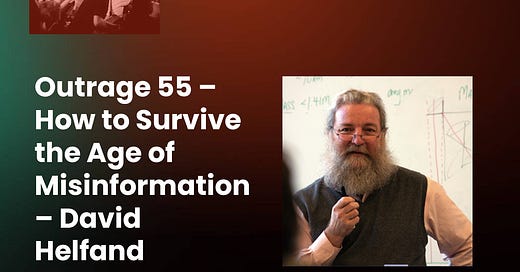Kicking Off 2025: How to Survive the Misinformation Age
Start the New Year with Clarity: Insights from Dr. David Helfand
Happy New Year, friends! 🎉
As we dive into 2025, it’s the perfect time to reflect on how we navigate the world around us—especially in an era where information (and misinformation) comes at us faster than ever. Our first episode of the year is a timely exploration of how we can cut through the noise, rebuild trust in expertise, and think critically about the deluge of data we encounter daily.
For this episode, I had the privilege of speaking with Dr. David Helfand, a renowned professor of astronomy at Columbia University, former president of the American Astronomical Society, and author of A Survival Guide to the Misinformation Age. With decades of experience in science and education, Dr. Helfand offers profound insights into why misinformation spreads, why we’re so susceptible to it, and—most importantly—how we can push back.
But before you hit play, let’s dive into one of the key ideas from our conversation: why false information is so compelling.
Why Misinformation Spreads Faster Than the Truth
Dr. Helfand explains that our brains are wired for survival, not accuracy. For hundreds of thousands of years, our ancestors relied on quick judgments to stay alive—spotting patterns to find food or avoid predators, reacting instantly to surprises, and trusting their immediate social circle for guidance.
Fast forward to today, and those same instincts are working against us. In a world dominated by social media, where algorithms prioritize shock and novelty, false information has the edge. A study from MIT found that misinformation spreads six times faster on social networks than the truth. Why? Because it’s surprising, emotionally charged, and perfectly tailored to our cognitive shortcuts.
As Dr. Helfand puts it:
“Our brains are designed to react quickly to surprises—an evolutionary trait that once kept us alive but now makes us vulnerable to misinformation. We need to consciously slow down and engage our critical thinking skills to counteract this.”
How to Push Back Against Misinformation in 2025
Here are three practical takeaways from Dr. Helfand’s insights:
Pause Before You Share: Ask yourself: Does this information surprise me because it’s new—or because it’s designed to provoke me? Taking a moment to reflect can break the cycle of knee-jerk reactions.
Embrace Skepticism, But With Evidence: True skepticism isn’t about rejecting everything outright. It’s about asking, “What’s the evidence?” and seeking credible sources.
Cultivate Scientific Thinking: This doesn’t mean memorizing facts. It means understanding concepts like correlation vs. causation, probability, and uncertainty. Think of it as a mental toolkit for making better decisions.
Listen to the Episode
In this conversation, Dr. Helfand takes us on a journey through the history of information, the psychology of misinformation, and actionable ways to think smarter in 2025.
Let’s Start the Year Strong
As we move into the new year, let’s commit to navigating this age of misinformation with clarity and purpose. Share this newsletter with a friend who might benefit from a fresh perspective, and let me know: What strategies are you using to cut through the noise?
Here’s to a year of thoughtful conversations, informed decisions, and meaningful change.
Warm regards,
David Beckemeyer
Host of Outrage Overload Podcast
P.S. Dr. Helfand’s latest book, The Universal Timekeepers: Reconstructing History Atom by Atom, is out this year—don’t miss it!
New This Week in Outrage Episode!
It’s everything the Outrage Overload podcast is not. It’s not edited. It’s not scripted. It’s lightly researched. It’s David and Lisa talking about this week in outrage, what was in the news, in the memes, and maybe finding some backstory with a humorous (at least to us) twist.
Welcoming 2025: Surviving the Holidays with a Broken Oven and White Carpet - 1/5/2025
This week, Lisa and David talk about holiday craziness; Elon Musk sock-puppet accounts cringe; Josh Hawley accuses credit card companies of monopolistic behavior; Tesla self-driving AI turns on AI Tech CEO …





